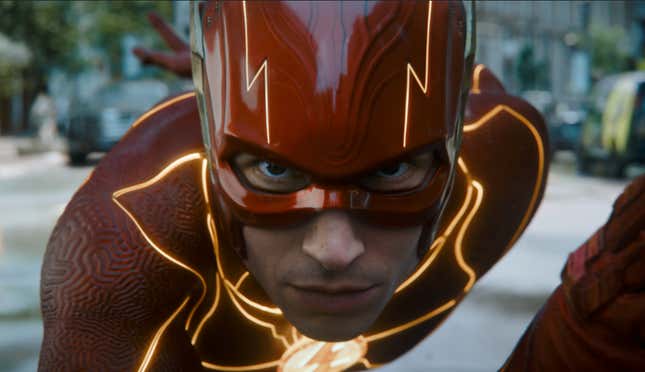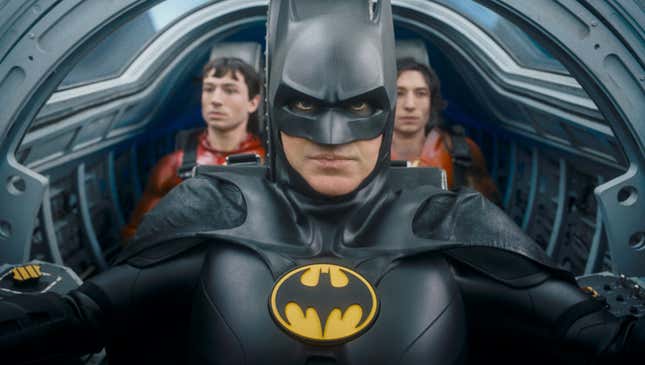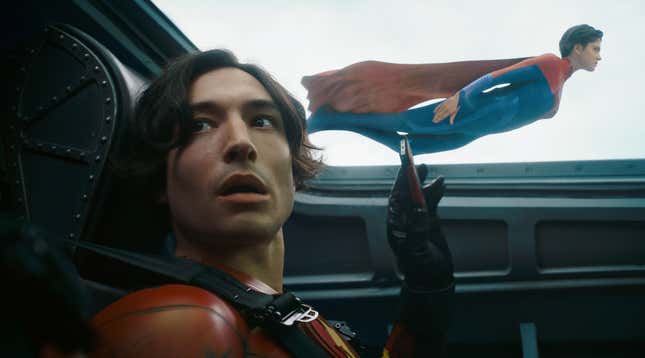Despite what the commercials, trailers, and posters are telling you, The Flash is not a movie about Batman or Supergirl. They’re both very much in it, sometimes more than once, and maybe after years of controversy and delays, Warner Bros. thought their inclusion would help get people into the theater. It probably will.
But, as the title succinctly suggests, The Flash is very much about “The Flash,” and those other characters are there merely to enrich a very personal story with the type of big-screen bombast fans expect from summer superhero movies. And enrich it they do, making The Flash a satisfying superhero experience, complete with epic scale, heartfelt emotion, a back door origin story, and a few issues along the way.
The Flash is directed by Andy Muschietti (It), from a screenplay by Christina Hodson (Bumblebee), which is based on a story by John Francis Daley and Jonathan Goldstein (Dungeons & Dragons: Honor Among Thieves), and Joby Harold (Army of the Dead). That may seem like a lot of cooks in the kitchen and the movie does, at times, feel like that. There’s a lot happening here, especially near the end. But for a movie that has been inching its way to theaters for almost a decade, more often than not The Flash beautifully blends lots of seemingly disparate ideas into one cohesive story.

That story centers on Barry Allen, once again played by Ezra Miller. Barry is now a full-fledged member of the Justice League (after, you know, Justice League), but despite being a very confident superhero, he’s not a very confident person. After an audacious opening set piece featuring multiple other Justice League members, we see scenes of Barry in his normal life, where his boss and colleagues dump on him, and we learn his father (Ron Livingston) is in jail for killing his mom (Maribel Verdú).
This means, basically, Barry lost both of his parents on the same day: the day his mom died and his father went to jail for it. But Barry knows his father is innocent, and when he realizes he can run so fast he can actually travel through time, Barry tries to do something about it. Here’s where The Flash becomes very Back to the Future as we get to see Barry go back in time, change something, and then deal with the fallout. And boy, is there fallout. Barry gets stuck with his 18-year-old self (also played by Miller), only this Barry has had a mom growing up. The plan worked! But the fact they’ve met changes everything and when Barry realizes General Zod (Michael Shannon) has arrived on Earth looking for Superman (events previously seen in Zack Snyder’s Man of Steel), he knows only one person can help him: Batman.
Writing that makes it sound a little confusing but Hodson’s screenplay is not that way at all. The story takes a few sharp, sudden turns but is always super focused on one goal or another, all while simultaneously dealing with Barry’s pain, his desire to change it, and the weight of what may have been a huge mistake. All while sprinkling in lots of twists, fun jokes, and Easter eggs.

Because Barry changed the past, the reality he’s in doesn’t have the same Batman as he’s expecting. No, this is an older Batman—one the audience itself will recognize from our own collective past (adding a whole other layer of meta). It’s, of course, Michael Keaton, and every single time his character is on the screen you’re hit with some sort of nostalgia or fan service, from his wonderful toys to the movie’s recreations of Wayne Manor and the use of Danny Elfman’s score. In doing that, Muschietti certainly risks overshadowing the story but, thankfully, never does. Batman, like every other character, is there to help the Barrys solve their problems. Oh, and if he can help them correct the timeline too, that would be a bonus.
As you may have guessed, this universe ends up housing Supergirl (Sasha Calle), and her excellent rescue scene with the two Flashs and Batman raises the stakes even further. Now, with two other superheroes helping them, surely both Barry Allens can defeat Zod, save this universe, and make everything right with his family?
The number of plates The Flash spins is incredible, mixing time travel tropes with multiversal madness and big action scenes with multiple superheroes, all of which have to incorporate Barry’s ability to run very, very fast in a visually interesting way. And it works. The narrative takes huge swings, most of the characters have their own journey, and just when the film gets as big or bigger than most other superhero movies, it brings things back to that core relationship of Barry, his parents, and if there’s anything this hero can do to save them.

Most superhero movies can get you to cheer, but not many can move you to tears, and that’s the ultimate superpower of The Flash. Much of that comes from the story, of course, but a lot of it also comes from the incredible versatility of Miller’s performance. Yes, Miller has had a very upsetting, controversial past off-screen in the years they’ve played the Flash; for some, their actions could be too much to forget or disconnect with. Which is valid and worth mentioning. However, if you are able to separate the character from reality, you’ll see that Miller has beautifully crafted two different versions of the same person, and then found a way to play those off each other with ease. There are things to love and hate about both Barrys and the way the performances almost feel like two halves of a whole really adds to the film’s themes of self-acceptance.
Calle is a stoic, imposing, vibrant onscreen presence as Supergirl, even if ultimately the character does not get quite the arc or screen time you may want. Which is one of the film’s bigger disappointments. And Keaton is, well, he’s Michael Freaking Keaton. He slips right back into his Bruce Wayne like not a day has passed and everything you loved about him in the Burton movies is right back there.
There are a few things other things to knock about The Flash—like how it feels slightly derivative coming after Loki, Spider-Man: No Way Home, Doctor Strange in the Multiverse of Madness, and the concurrent release Spider-Man: Across the Spider-Verse—or how some of the effects look crappy because they’re in Barry’s “Speed Force.” Also, the film’s ending feels like a cherry on top of a bowl of cherries and is almost too much. It’s hilarious but by that time, so much has happened that’s aimed to delight and surprise comic book fans, you almost want it to stop.
Nevertheless, if a film can give you things that are exciting and heartfelt, all while you laugh and smile along, that’s hard to beat. And The Flash is definitely hard to beat in the conversation of the best DC movies of this era.
The Flash zooms into theaters June 16.
Want more io9 news? Check out when to expect the latest Marvel, Star Wars, and Star Trek releases, what’s next for the DC Universe on film and TV, and everything you need to know about the future of Doctor Who.






